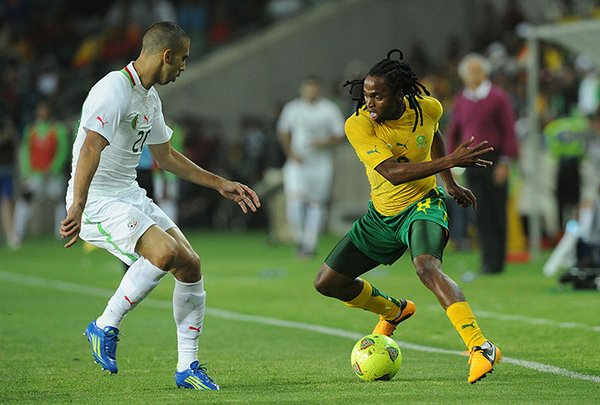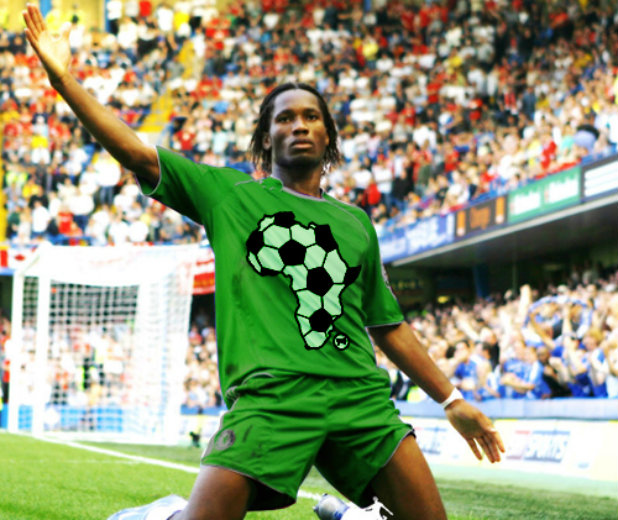
BRASÍLIA — This has been a history-making World Cup for Africa, and not just for the number of contentious meetings, suspensions and threatened player boycotts. For the first time, two teams from the soccer-adoring continent advanced to the knockout stage of the tournament.
But that sense of accomplishment succumbed to reality in a matter of hours Monday as both teams battled hard but lost to favored opponents, leaving behind more lasting images of training ground strikes, cash-laden airplanes and an assortment of missed opportunities.
Algeria lost to Germany, 2-1, in overtime and Nigeria lost to France, 2-0, leaving Africa without a team in the quarterfinals for the first time since 2006. No African team, despite a history of dazzling players, has ever reached the semifinals.
“Why do we go home early?” Nigeria’s coach, Stephen Keshi, said after Nigeria’s elimination on Monday. “If I were on the field playing I don’t think I would want to go home. Maybe there are some players without too much focus on the game, and there’s probably a lot of things that are going on.”
Five African teams qualified for the World Cup, and three of them, including Nigeria, engaged in some player protest or impromptu negotiations with their soccer federations over money they were concerned they would never see.
Cameroon took the initiative even before the team boarded its plane for Brazil, with the players demanding their appearance fee for the World Cup up front, in cash. Or else, they said, they would not go. Last week the players from Ghana refused to practice and threatened a player strike in their game against Portugal unless they quickly received more than $3 million, cash in hand.
One day later, the players from Nigeria also refused to practice and made the same demand of their soccer federation: Pay us now, in cash, or we go home.
Ultimately, the presidents of Ghana and Nigeria intervened to settle the turmoil, but not before more rancor bubbled up. Two of Ghana’s best players — Kevin-Prince Boateng and Ali Sulley Muntari — were suspended before the final game when the disputes grew more personal.
The World Cup is the grandest sporting event on the planet, a chance for every nation to show off to the world, through its soccer teams. But unattractive issues sometimes emerge, too.
“I think every national soccer team reflects its country’s characteristics,” said Steve Bloomfield, the author of “Africa United: How Football Explains Africa.” “In Africa, these problems sometimes crop up. But it is not only Africa. Four years ago, France fell apart, and it wouldn’t be a World Cup without seeing the Netherlands implode.”
To be sure, France, the Netherlands and England have at times been splintered through infighting, and in 1974 West Germany nearly staged a boycott ahead of its own World Cup over a payment dispute.
Italy has been embroiled in scandals involving top clubs, and Ireland has had public spats over payments to players, too. Even Johan Cruyff, the great Dutch star, once refused to wear his Adidas team jersey because he was paid by Puma.
But in recent years some of the Western African nations have taken the money squabbling to new levels. At the 2006 World Cup, Togo boycotted a training session and threatened to skip a game in order to force its soccer association to pony up the dough.
Ghana’s one-day training strike last week before the arrival of its cash came two days before it played a pivotal game against Portugal. It was no way to prepare for a critical contest, and Ghana lost, 2-1.
On Thursday, before their game against France, the Nigerian players followed the Ghanaians’ lead, refusing to practice and threatening to strike unless they were paid. Eventually, President Goodluck Jonathan intervened and assured the players that after the World Cup they would get their money.
Keshi denied that there was ever a threat of a Nigerian strike and said a visit to the team from government officials Sunday included a bonus payment. The rest of the money is expected to arrive later.
“Whatever money that we got was just a bonus to encourage every individual to come out and do his best today,” he said.
Africa is a continent as diverse as any other, but the countries that do send their teams to the World Cup often do not have the same resources of many of their competitors. Some of them also grapple with issues of corruption and favoritism.
Sean Jacobs, a self-described “terrible club player” from Cape Town teaches a course called Global Soccer, Global Politics at the New School in New York. He noted that Algeria had no discernible issues at this World Cup, and played very well, but that financial problems do tend to afflict the Western African countries.
“Every tournament since 1990 Cameroon has had a problem with money,” Jacobs said. He said that there was no accountability for some of the soccer associations in Africa and that they “act with impunity.”
“I don’t want to talk about this because we have become a laughingstock,” said one Ghanaian journalist, who asked not to be identified. He was not the same journalist who booed the players after the Portugal game, prompting Asamoah Gyan, a Ghanaian forward, to try to fight the man.
The success of numerous African players in the richest leagues in Europe and elsewhere is a factor in the recurring disputes. Upon experiencing the first-class travel and guaranteed money of those leagues, those players are less tolerant of anything less than that from their national soccer associations.
Bloomfield, who is a former correspondent for The Independent newspaper in Kenya, said African players are often distrustful of their soccer associations and said he did not blame them for feeling that way.
Most soccer associations pay their players after the World Cup, once FIFA, world soccer’s governing body, has made its disbursements.
But some players in Africa have concluded that their only leverage comes before a World Cup game, even it if appears they are holding their nation for ransom. Bloomfield reckons that star players like Boateng and Didier Drogba of the Ivory Coast now actually have more influence than their own soccer associations, which enables them to push the payment issue on behalf of their teammates, any number of whom do not play in Europe and do not earn nearly as much money.
The Ivory Coast did not have any public disputes in this World Cup, but with one of the most talented teams in the tournament, they were disappointed not to fare better. Drogba, however, said the reason Africans teams haven’t advanced as far as the World Cup semifinals has more to do with probability than financial disputes.
“We only have five teams in the World Cup out of 32,” he said.
FIFA has been watching all the turmoil and has been involved in the recent pay negotiations. In the future, it wants to eliminate the problem.
“It’s sad that we end up with stories where we are talking about a strike and the players would not play if they don’t receive their money,” said FIFA’s general secretary, Jérôme Valcke. “The fact that the money came in cash is also sad.”
For the Ghanaian players, it did not appear sad at all, except for the tax implications. They each received crisp stacks of United States bills equaling more than $100,000 per man, after the Brazilians took 17 percent at the airport. James Kwesi Appiah, Ghana’s coach, said the reason players wanted the money in cash was a matter of tradition.
“In a normal sense it should be paid straight to a bank account,” he said. “But you are coming from a different area, and you need to understand the differences.”
One of the Ghanaian players, John Boye, was photographed kissing his bundle of cash. The next day, he accidentally scored a goal against his own team as Ghana’s World Cup ended in acrimony. In a tournament that held so much promise for Africa, the rest of the teams are gone, too.











Why West Africa continually is referred to as Western Africa beats me. This wording, this kind of language, 'Western Africa', I hope is not a sign of a broader attempt by Western Europe, Western Countries, and the US to begin a battle of semantics of the hugely unpopular 'Western' brand in the world.